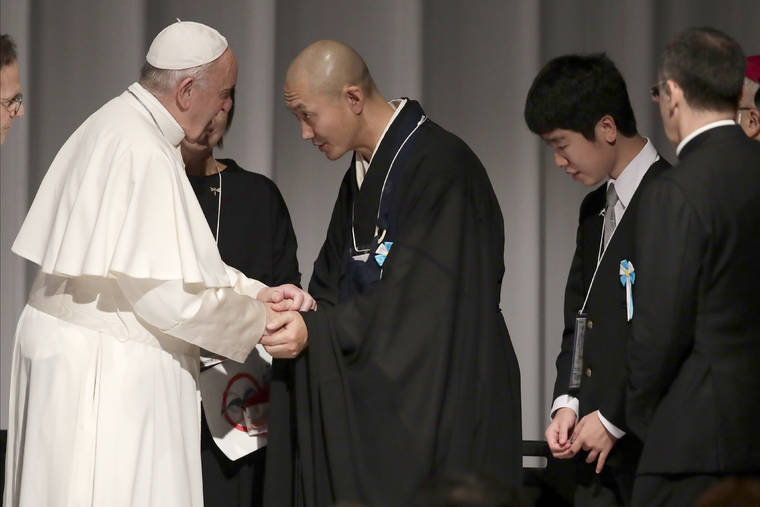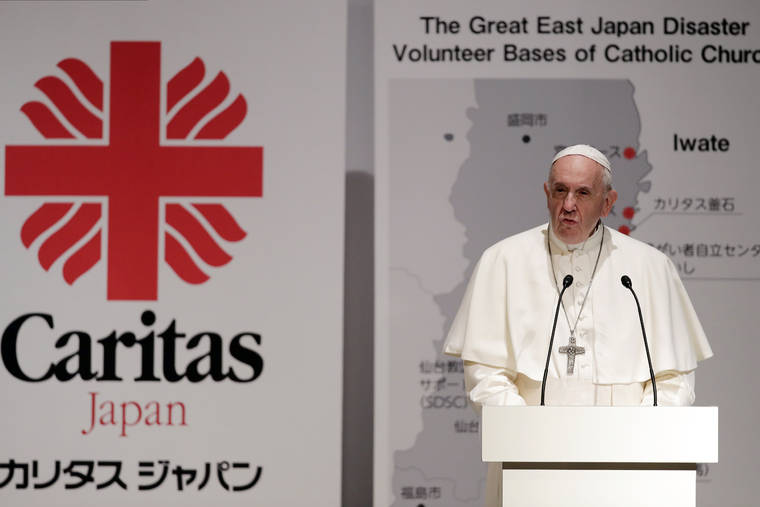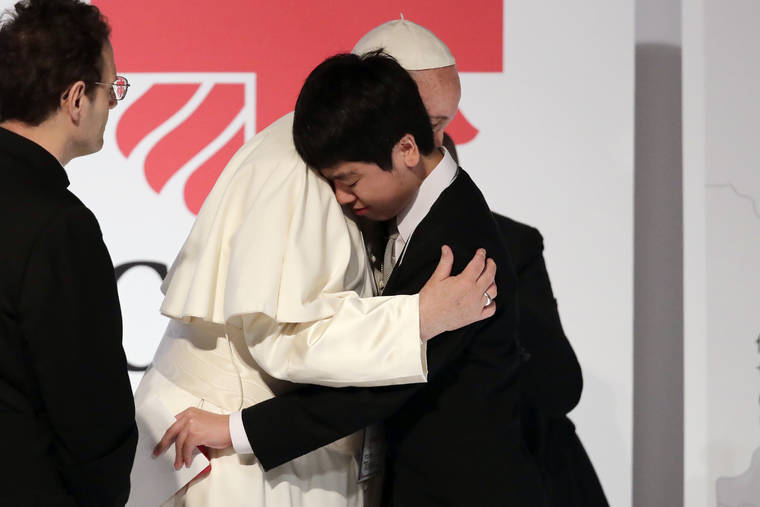TOKYO — Pope Francis met Monday with victims of Japan’s 2011 nuclear disaster and called for the world to rethink its reliance on nuclear power as it considers the planet it wants to leave to future generations.
Francis recalled that Japan’s Catholic bishops called for the abolition of nuclear power plants in the aftermath of the “triple disaster,” in which three reactors at a nuclear plant in Fukushima melted down after an earthquake triggered a tsunami.
The meltdown coated the area in radioactive fallout and at one point forced the displacement of 160,000 people. Nine years later more than 40,000 people still can’t return home.
Francis didn’t make the call to abolish nuclear power in his speech before victims. But in citing the position of Japanese bishops and his own calls for lifestyle changes that consider the environment, he made clear that “important decisions will have to be made about the use of natural resources, and future energy sources in particular.”
“As we think about the future of our common home, we need to realize that we cannot make purely selfish decisions, and that we have a great responsibility to future generations,” he said. “Consequently, we must choose a humble and sober way of life that recognizes the urgent realities we are called to face.”
During his first full day in Japan on Sunday, Francis visited Nagasaki and Hiroshima — sites of where two U.S. atomic bombs were unleashed in World War II — and said both the use and possession of nuclear weapons was “immoral.”
He has not articulated a formal position on nuclear power, but the Vatican has previously called for the “safe, secure, and peaceful, development and operation of nuclear technologies.”
Francis spoke after listening to searing testimony from victims, including Matsuki Kamoshita, a 17-year-old high school student from Iwaki on the eastern coast of Fukushima.
Kamoshita wrote to the pope last year begging that he visit Fukushima to see for himself the impact. He was rewarded with a papal audience at the Vatican, and on Monday a chance to address the pope in public to tell his story.
The day after the tsunami, Kamoshita’s parents and his little brother evacuated and eventually ended up in Tokyo to stay away from the radiation. Instead of sympathy, he faced bullying at school, where he was treated as if “infectious.”
In his speech to the pope Monday, Kamoshita lamented that the government had “given up” on housing evacuees while continuing to pursue nuclear power as a state policy.
“It will take many times longer than my lifetime to restore the contaminated land and forests,” he told the pope. “So, for us who live there, adults have a responsibility to explain without concealing anything about radioactive contamination, exposure, and possible damage in the future. I don’t want them to die before us, having lied or not admitting the truth.”
Kamoshita asked for the pope to pray that political leaders find another path.
“And please pray with us that people from all over the world will work to eliminate the threat of radiation exposure from our future,” he said.
After he finished, he approached the pope, who took him in his arms for a long embrace.
The pro-nuclear government of Prime Minister Shinzo Abe has sought to restart as many reactors as possible to keep the nuclear industry and technology alive, especially as it seeks to showcase its recovery ahead of the Tokyo Olympics next year.
Areas that used to be under the no-go zone in Fukushima have opened following decontamination efforts, prompting people to return home and resulting in cuts to government financial support for evacuees.
The government’s compensation policy and differing views about lingering radiation concerns have caused a deep divide among Fukushima residents, whose voices and concerns have largely been eclipsed nine years after the disaster.
“Regardless of the position on what to do with nuclear energy, its victims here are suffering under the government policy that has marginalized them,” said Kazuko Ito, secretary general of Human Rights Now.
Ito welcomed Francis’ visit as a chance to “shed light on the issue and let their voices be heard.”
Francis’ meeting with the victims kicked off a busy day of activities in Tokyo, including a private audience with Emperor Naruhito, a rally with young people and Mass at the Tokyo Dome.
During his meeting with young people, Francis denounced what he called an “epidemic” of bullying that is afflicting youth in Japan and elsewhere. He was responding to testimony from three students who recounted the pressures they face in a hyper-competitive society, their feelings of inadequacy and the cruelty they sometimes face from their classmates that drives some to suicide.
“We must all unite against this culture of bullying and learn to say “Enough!” Francis told them.
At the end of the day, he delivers his main political speech to Abe and government authorities.
Francis wraps up his weeklong trip to Asia with a speech Tuesday at Sophia University, Japan’s main Catholic university founded by his Jesuit order a century ago.




